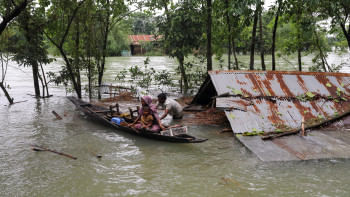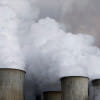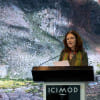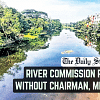COP29 is a tipping point for addressing climate change

Climate scientists have warned that climate change is progressing faster and affecting a wider area, with severe impacts across the globe. The devastating effects of climate change are felt from the bottom of the sea to the top of the hills, through coastal and plain lands. Antonio Guterres, the UN Secretary General, in his opening remarks at a plenary session at COP29 in Baku, stated that 2024 has seen the hottest day, the hottest month, and the hottest year on historical record. People are bracing for the next cyclone. Nonstop floods are destroying agriculture, crops, and infrastructure, affecting the food security of millions. A large number of children in African and Asian countries are going to bed hungry due to climate-induced shortages of produce.
A recent report by the Potsdam Institute for Climate Impact Research (PIK) on "10 Insights in Climate Science" has cautioned that the world is not on the right track, as climate actions, particularly mitigation for the reduction of greenhouse gases (GHGs), are severely lacking, especially among developed countries. The World Meteorological Organization (WMO) has reported that the average global temperature crossed 1.5 degrees Celsius in January 2024. Thus, the pace of climate change is rapid and forceful, with grave consequences for ecosystems. Scientists fear severe additional penalties, as climate change is a multiplier of risks, vulnerabilities, and socio-economic issues.
Climate change aggravates poverty, food, water and livelihood insecurity, which may lead to further social, gender inequities and conflict over limited resources, along with long-term social unrest in many parts of the world. The PIK report asserts that social systems in many countries could reach a threshold, or a social tipping point, due to the growing impacts of climate change, causing societies and economies to fall into an unrecoverable state. Early signs of this emerging situation are evident in some African countries, where thousands of poor and climate-vulnerable people are being forced to migrate to neighbouring countries due to hunger and famine caused by extreme drought and frequent crop destruction.
In Bangladesh, people are facing alarming situations in climate hotspots, particularly in the coastal regions and north-central river basins, where they encounter multiple climate disasters year-round. They are exposed to cyclones, increased soil salinity, floods, soil erosion, drought, heat stress, and cold. These impacts affect the lives and livelihoods of millions of poor people, women, and socially excluded groups. They are unable to cope with the drastic changes in the local climate and its devastating effects. Thousands of people are displaced by climate extremes every year, and they are forced to migrate to large cities in search of livelihoods and shelter. However, these climate migrants are not welcomed by city residents or governments. They often end up in city slums and fringe areas, living in inhuman conditions without basic amenities such as food, adequate housing, water, sanitation, and healthcare. Women, children, and girls face significant insecurity and violence on their journey to the cities. Many of them never return to their villages of origin. They become homeless and are frequently evicted. As a result, their social ties, community connections, and social cohesion are broken.
Solving the climate crises requires policy responses for both adaptation and mitigation, adequate global finance, technological innovation, capacity building, institutional support for the vulnerable communities, and local climate actions. The global strategies and responses are discussed at COP every year. Unfortunately, the developing nations and poor countries who are the innocent victims of climate change do not get much support from the developed countries, which are responsible for creating the problem.
We have observed with great concern that the major key players and climate negotiators—the presidents of the US, Russia, and China—are absent from this COP. This may negatively influence the decisions and ultimate outcomes of the COP. It is also feared that the major polluting countries are not committed to providing the necessary funds for adaptation and mitigation. However, a successful COP will require commitments to boost adaptation goals with adequate climate finance, develop strategies and actions for moving away from fossil fuels, and accelerate net-zero carbon emission strategies.
We hope that the civil society organisations, thousands of youths, environmental agencies, NGOs, human right groups, and media participating in COP29 will put pressures on the negotiators and global leaders to deliver the right strategies, targeted actions, and desired outcomes for the people. These actions are essential to reduce growing climate risks and vulnerabilities, address the emerging social tipping point, take urgent mitigation actions, and protect ecosystems and the planet.
Dr Dwijen L Mallick is fellow and director at Bangladesh Centre for Advanced Studies (BCAS).
Views expressed in this article are the author's own.
Follow The Daily Star Opinion on Facebook for the latest opinions, commentaries and analyses by experts and professionals. To contribute your article or letter to The Daily Star Opinion, see our guidelines for submission.


 For all latest news, follow The Daily Star's Google News channel.
For all latest news, follow The Daily Star's Google News channel. 










Comments